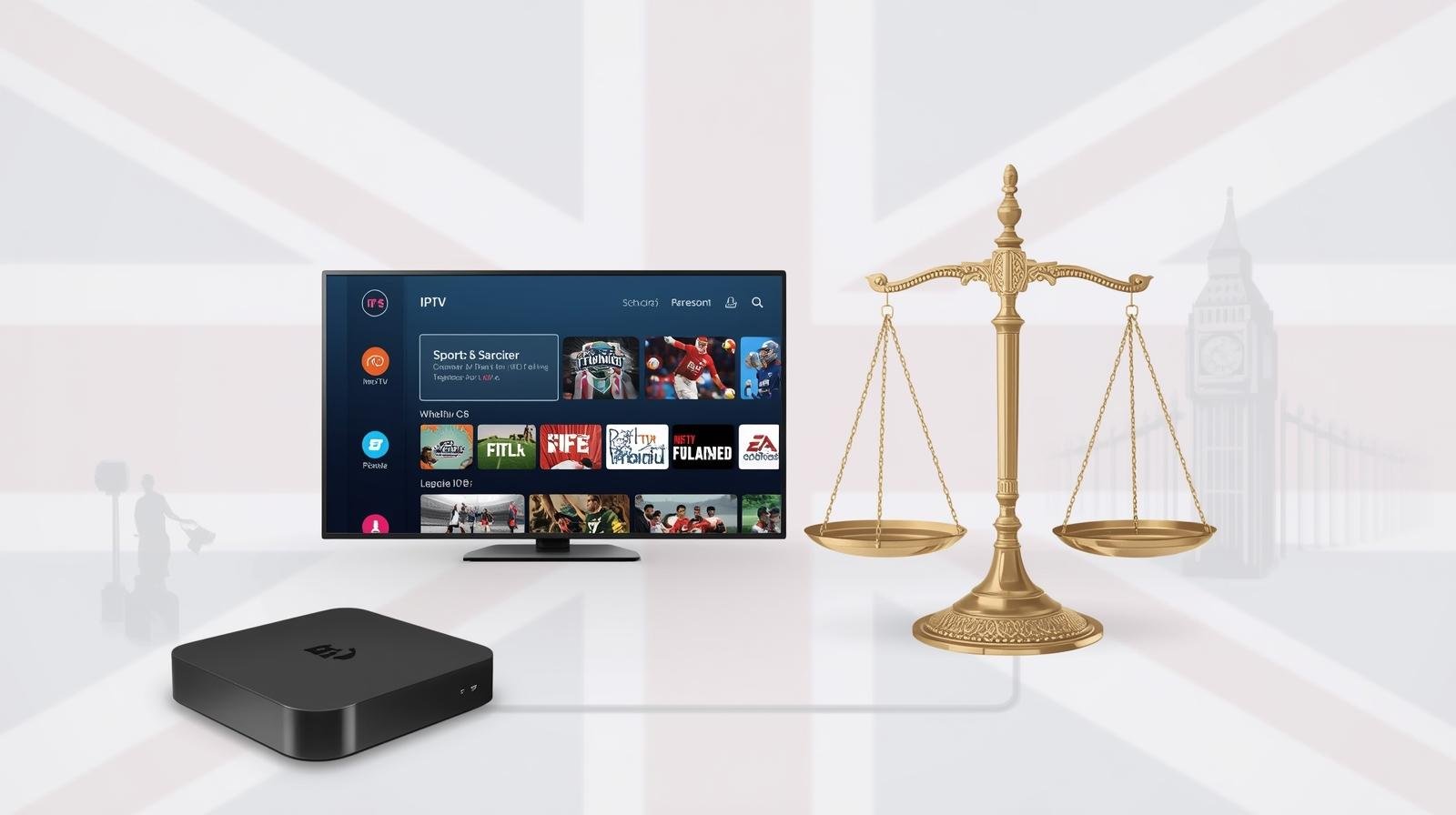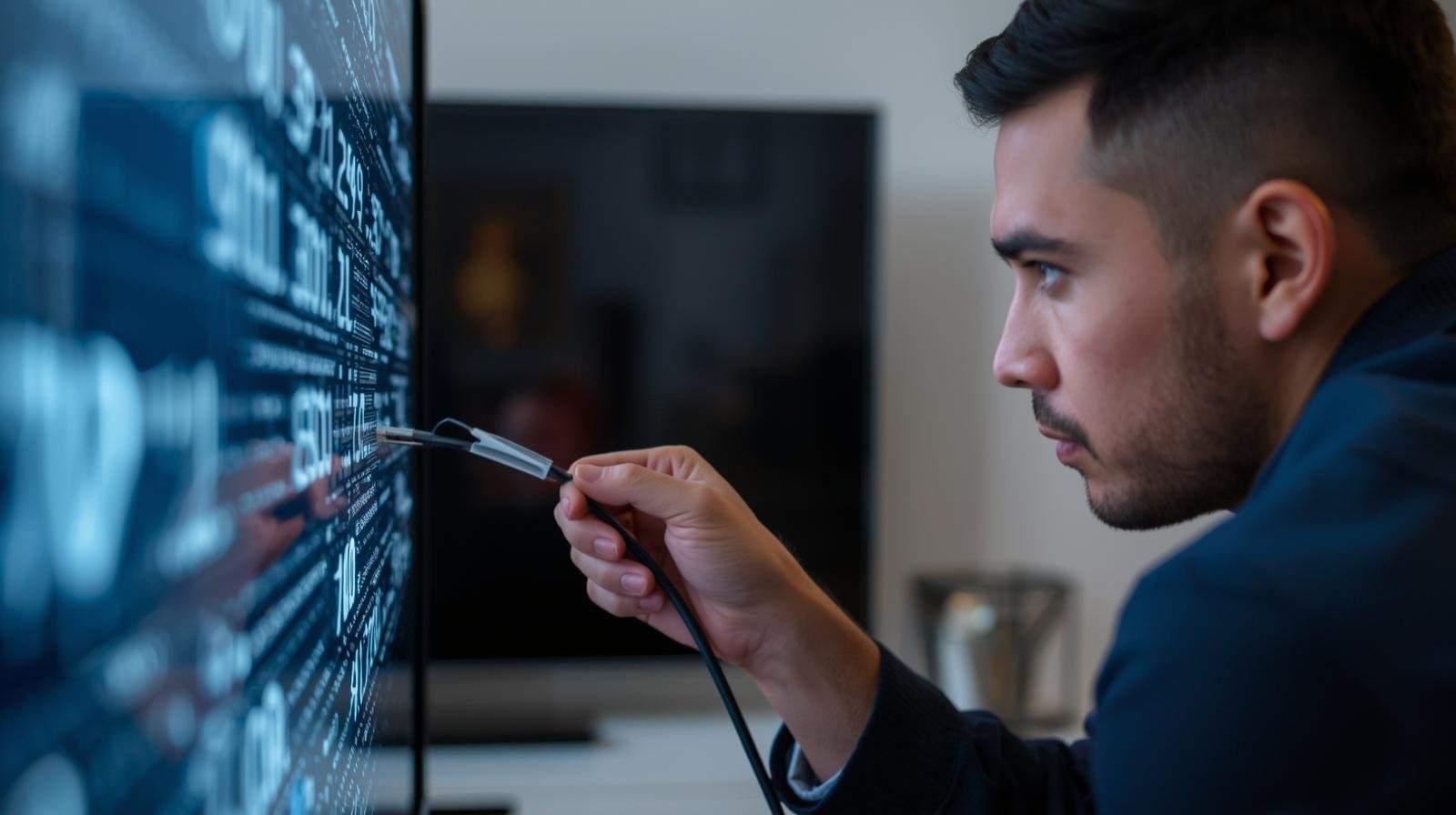1. What is IPTV?
IPTV stands for Internet Protocol Television, meaning TV content is delivered using internet connections instead of traditional aerial (Freeview), satellite dish (Sky), or cable (Virgin).Legal IPTV UK Explained.
Types of IPTV services in the UK:
- Free & Public Services: Freeview Play, BBC iPlayer, ITVX, All 4, My5.
- Subscription Streaming Apps: Netflix, Disney+, Amazon Prime Video, NOW, Discovery+.
- Operator IPTV Platforms: Sky Stream, EE TV, TalkTalk TV.
- Sports-Specific Apps: TNT Sports via Discovery+, Sky Sports apps, DAZN (boxing, MMA).
These are all legal IPTV options, provided they operate under rights agreements.
2. UK Broadcasting Rights — Who Owns What?
Broadcasting rights are at the heart of IPTV legality. In the UK, different companies purchase exclusive rights to show specific content.
Sports Rights
- Premier League (2025): Sky Sports, TNT Sports, Amazon Prime Video.
- F1: Sky Sports (live), Channel 4 (highlights + British GP live).
- UEFA Champions League: TNT Sports (via Discovery+).
- FA Cup: BBC & ITV share coverage.
- Wimbledon: BBC holds exclusive rights.
Entertainment & Drama
- BBC: Homegrown dramas, documentaries, factual, comedy.
- ITV: Entertainment, soaps, reality TV.
- Sky Atlantic / Sky Originals: Big-budget US and UK series (exclusive rights).
- Netflix / Prime Video / Disney+: Global streaming rights for films and original shows.
Movies
- Sky Cinema: First-run rights for many blockbuster films.
- Streaming platforms: Netflix, Disney+, Prime — rights vary by window.
📌 Rights are territorial — UK-based services can only stream within the UK (unless you use roaming allowances in the EU or a VPN, though the latter may breach T&Cs).
3. Licensing & the Role of Ofcom
In the UK, broadcasting and IPTV are regulated by Ofcom (Office of Communications). Ofcom ensures:
- Broadcasters and IPTV providers hold the correct content rights.
- Services meet standards for content protection (age ratings, parental controls).
- Illegal IPTV distributors are shut down with help from police and anti-piracy agencies.
Licences also extend to technology: providers often need a broadcasting licence if they transmit live content over IP networks.
4. TV Licence — Do You Still Need It with IPTV?
The TV Licence remains one of the most misunderstood topics for IPTV users.
When You Need a TV Licence
- If you watch or record live TV on any device, via any service (BBC, ITV, Sky, NOW, Amazon, etc.).
- If you use BBC iPlayer for live or catch-up content.
When You Don’t Need a TV Licence
- Watching on-demand, non-live content from non-BBC services (Netflix, Disney+, Amazon Prime, ITVX Premium without live channels).
- Watching DVDs, downloaded films, or gaming.
Cost (2025): £169.50/year for a colour TV Licence.
📌 Many people assume streaming exempted them from the licence — this is wrong. Watching Sky Sports live via NOW on a Fire Stick still requires a TV Licence.
5. Legal IPTV Providers in the UK
Free Services
- BBC iPlayer (requires licence for use).
- ITVX (ad-supported, optional Premium upgrade).
- All 4 (Channel 4’s platform).
- My5 (Channel 5).
- Freeview Play — integrates all free channels + catch-up apps.
Paid Services
- Sky Stream (full Sky channels in UHD over IP)
- NOW (flexible Sky passes).
- Discovery+ with TNT Sports.
- Amazon Prime Video (includes select live Premier League).
- Netflix / Disney+ / Apple TV+ (on-demand only).
Operator Bundles
- EE TV / BT TV: IPTV box with bundled broadband + NOW/Discovery+.
- TalkTalk TV: Budget IPTV add-on.
6. Illegal IPTV in the UK — Why It’s a Problem
You’ve probably seen ads for IPTV services offering “all Sky Sports, BT Sport, movies & PPV” for £10/month. These are illegal.
Risks
- Legal Consequences: UK courts have prosecuted IPTV resellers; some end-users have faced warnings and fines. FACT and police regularly seize servers.
- Security Risks: Malware, stolen credit card info, compromised personal data.
- Unreliable Quality: Streams often freeze or disappear mid-event.
- No 4K Guarantee: Most pirated streams are poor-quality, compressed feeds.
📌 The UK government treats illegal IPTV as content theft, and enforcement has intensified in recent years.
7. IPTV & Copyright Law
Under the Copyright, Designs and Patents Act 1988, only licensed distributors can legally transmit TV programmes and live events.
Key points:
- Streaming pirated content is illegal (not just uploading).
- Devices preloaded with illegal IPTV apps can be seized.
- Resellers and distributors face prison terms and fines.
This is why sticking to licensed providers is crucial.
8. Devices for Legal IPTV
You don’t need expensive hardware. Legal IPTV services run on:
- Smart TVs (Samsung, LG, Sony with app stores).
- Streaming sticks: Amazon Fire Stick, Roku, Google Chromecast with Google TV.
- Operator boxes: Sky Stream puck, EE TV box.
- Games consoles: Xbox Series X/S, PS5.
- Mobile/tablet apps: iOS, Android.
Most services allow multiple devices & profiles for families.
9. Broadband Requirements for IPTV
For smooth legal IPTV streaming:
- HD (1080p): At least 5–10 Mbps.
- 4K UHD: Minimum 25 Mbps per stream.
- Multiple streams (family use): 50–100 Mbps broadband.
📌 Most UK homes now have sufficient speeds via fibre broadband, but always check before subscribing.
10. Family Considerations — Parental Controls & TV Licence
- Parental Controls: BBC iPlayer, ITVX, NOW, Netflix all offer parental PINs and age-restricted profiles.
- TV Licence Reminder: If kids watch live CBBC on iPlayer, your household still requires a TV Licence.
- Multi-room IPTV: Many services allow 2–4 concurrent streams for different family members.
11. Cost Comparison — Legal IPTV vs Illegal IPTV
| Option | Monthly Cost (approx.) | Legal? | Quality | Risks |
| Freeview Play | £0 | ✅ Yes | HD | None |
| NOW Sports Pass | £34.99 | ✅ Yes | HD/Boost | None |
| Sky Stream (with Sports) | £46+ | ✅ Yes | 4K UHD | None |
| Discovery+ (TNT) | £30 | ✅ Yes | HD/UHD | None |
| “Pirate IPTV service” | £10 | ❌ No | Unstable | Legal, malware |
📌 Although illegal IPTV seems cheaper, the risks outweigh the savings.
12. The Future of IPTV Regulation in the UK
Looking forward:
- Stronger anti-piracy enforcement (FACT, Europol, City of London Police).
- TV Licence reform: Debates continue — some push for a subscription-style model by 2030.
- More direct-to-consumer rights: The Premier League and other sports may eventually sell streaming packages directly.
- Default 4K: Expect UHD to become the norm.
✅ Final Recommendations
- Stick to licensed IPTV providers (NOW, Sky Stream, Discovery+, Freeview, Prime).
- Remember: A TV Licence is legally required for live TV and BBC iPlayer.
- Avoid illegal IPTV — prosecutions are real, and security risks are high.
- Choose flexible packages (NOW, Prime) if you’re budget-conscious, or Sky Stream for full 4K premium sports and entertainment.
- For families: enable parental controls, budget for the TV Licence, and bundle broadband + IPTV where possible for savings.
Closing Thoughts
IPTV in the UK is here to stay — offering flexibility, 4K streaming, and the ability to cut ties with old satellite dishes and cable boxes. But legality matters: rights and licensing are tightly enforced, and the TV Licence is still very much in play. Legal IPTV UK Explained. By understanding the rules around IPTV rights, licensing, and compliance, you can enjoy the full benefits of modern streaming — without risks, fines, or dodgy providers.

